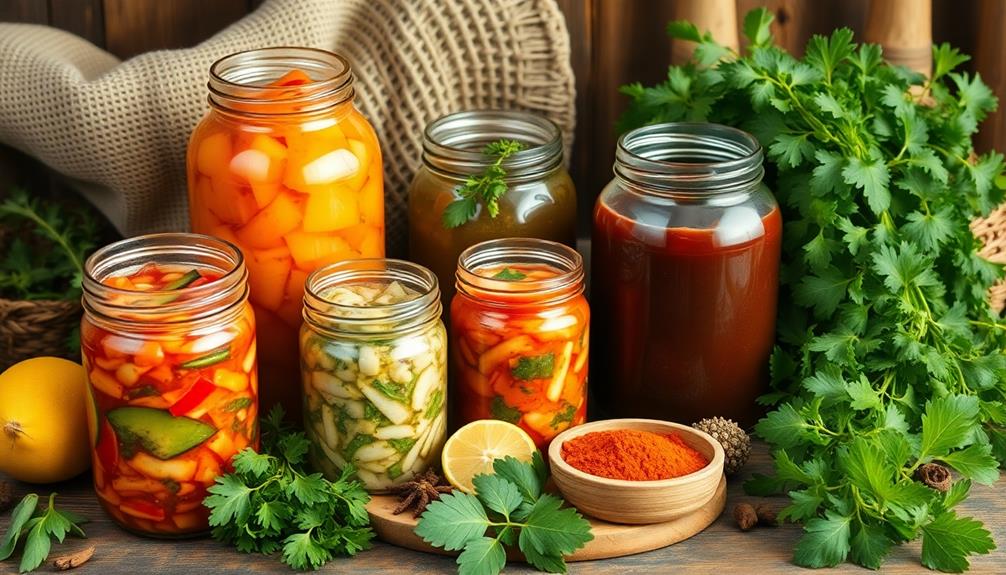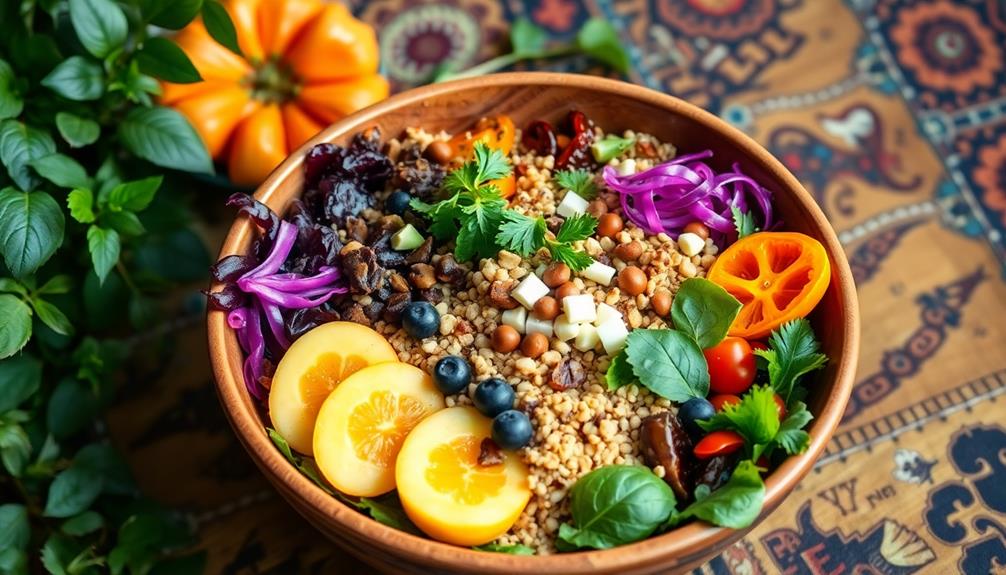Fermentation is essential to promote good digestive health and overall well-being. This natural process utilizes bacteria and yeast to convert sugars into beneficial compounds, providing your body with vital nutrients. Adding fermented food like yogurt, kimchi, and sauerkraut to your diet can improve digestion and boost your immune system. Consuming these foods regularly introduces probiotics that help maintain a healthy balance of bacteria in your gut, reducing the risk of health problems such as obesity and gastrointestinal issues. Additionally, fermented foods can enhance the taste of your meals! If you’re interested in incorporating these delicious foods into your daily meals or want to try making them yourself, there’s a world of possibilities to explore.
Key Takeaways
- Gut health is essential for overall well-being, influencing digestion, immune function, and mental health through the gut-brain connection.
- Fermentation enhances food flavor and nutritional value, preserving perishable foods while promoting a diverse microbiome rich in probiotics.
- Common fermented foods include yogurt, kimchi, sauerkraut, kefir, and kombucha, all offering significant health benefits.
- Successful fermentation requires specific conditions, including anaerobic environments, optimal temperature, and pH monitoring, to ensure safety and quality.
- Incorporating fermented foods into your diet can improve digestion, support immune function, and potentially enhance mental well-being.
The Role of Gut Health
Gut health is fundamental to your overall well-being, influencing everything from digestion to immune function. A balanced gut microbiome, filled with beneficial probiotics, plays an essential role in how your body processes nutrients and fights off illness.
When your gut is healthy, it can help prevent a range of health issues, including obesity, diabetes, and gastrointestinal disorders. Incorporating air purifiers for better air quality can also contribute to your overall health by reducing allergens and pollutants that may affect your gut.
Research shows there's a strong gut-brain connection. This means your gut health can affect your mental health, mood, and cognitive function. If your gut microbiome is thriving, you're likely to feel more energetic and focused.
To support this balance, regular consumption of probiotics found in fermented foods, like yogurt and sauerkraut, is essential. These foods help promote a diverse microbiome, which is key to maintaining gut health.
Additionally, incorporating prebiotic-rich foods—like onions and bananas—into your diet can enhance these benefits. Prebiotics feed the beneficial bacteria in your gut, creating an ideal environment for them to flourish.
What Is Fermentation?
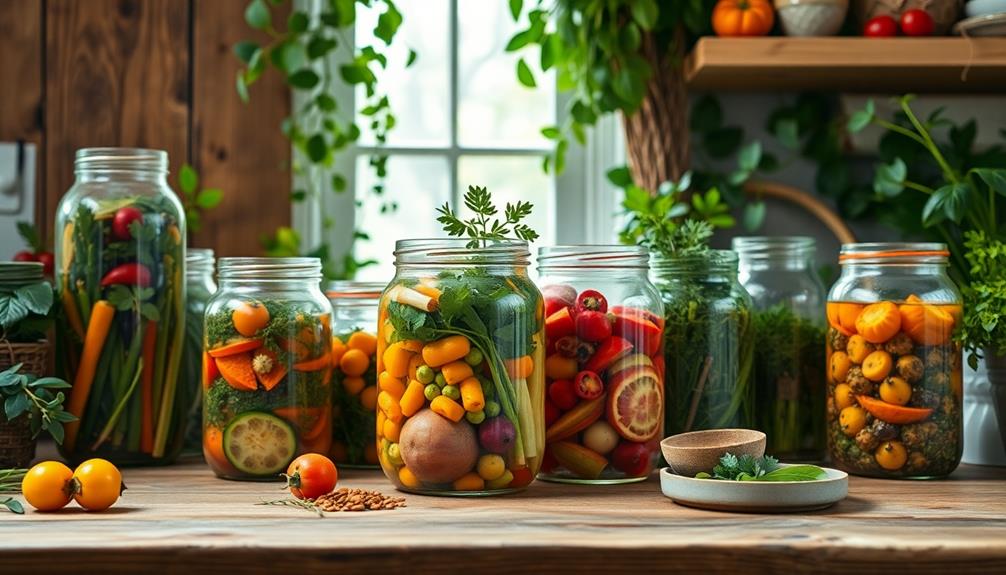
Fermentation is a fascinating metabolic process that plays a significant role in enhancing the foods we consume, making them not only tastier but also healthier for your gut. This ancient technique occurs in the absence of oxygen, allowing microorganisms like bacteria and yeast to convert sugars into acids, gases, or alcohol. By doing so, fermentation preserves perishable foods and boosts their flavor, contributing to global culinary traditions.
For instance, beverages like kombucha, which is known for its probiotic properties, have gained popularity for their potential health benefits and unique taste health aspects of kombucha.
You may be familiar with various types of fermentation, such as lactic acid fermentation, which produces yogurt and kimchi, or alcoholic fermentation, responsible for wine and beer. Each type imparts unique flavors and textures to fermented foods, making them delightful additions to your meals.
One of the most significant benefits of consuming fermented foods is their richness in good bacteria, or probiotics. These beneficial microorganisms support your gut health by promoting a balanced microbiome, improving digestion, and enhancing nutrient absorption.
Additionally, fermentation not only extends the shelf life of foods but also makes nutrients more bioavailable, potentially leading to improved overall health and well-being. Embracing fermented foods can be a delicious and rewarding way to support your gut health journey.
Fermentation Process Explained
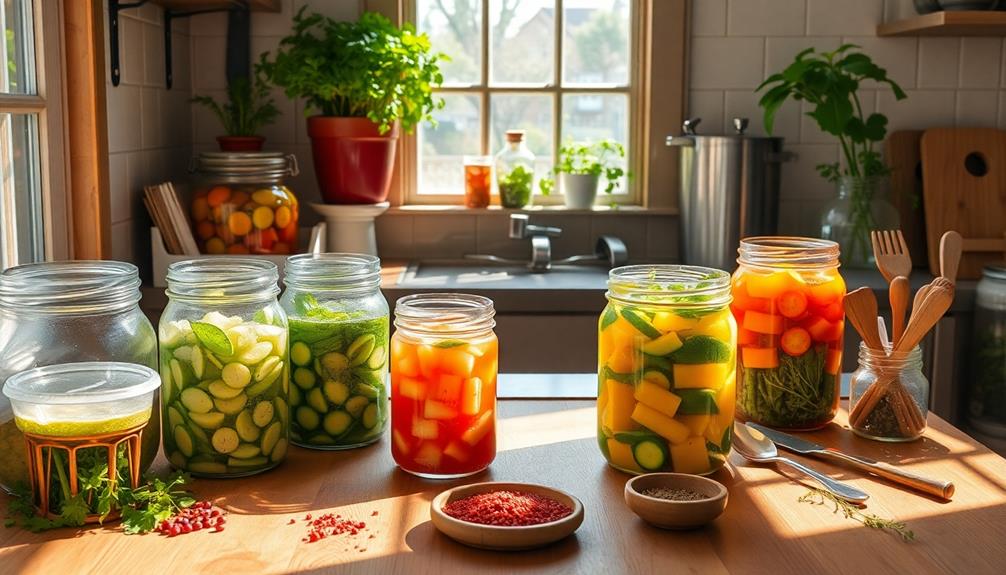
Fermentation is a fascinating process that transforms sugars into beneficial compounds through the action of microorganisms. This process not only creates delicious flavors but also enhances nutritional value, such as in the case of nutritional advantages of green juice.
You'll want to understand the basics, key methods, and the importance of creating the right conditions for successful fermentation.
Fermentation Basics Overview
At its core, fermentation is a captivating metabolic process that transforms sugars into acids, gases, or alcohol through the action of microorganisms like bacteria and yeast. This process occurs under specific conditions, such as the right temperature, time, and anaerobic environments that favor the growth of beneficial microorganisms.
Notably, just as heat pumps utilize advanced technology for efficiency, fermentation also relies on the right conditions to optimize the growth of these microorganisms, ensuring the best results for your gut health the benefits of heat pumps.
There are several common types of fermentation. Lactic acid fermentation, which produces foods like yogurt and kimchi, enhances flavors and promotes gut health. Alcoholic fermentation creates beverages like beer and kombucha, while acetic acid fermentation produces vinegar.
Fermented foods not only taste great but also increase the bioavailability of nutrients, making it easier for your body to absorb essential vitamins and minerals.
Safety in fermentation is essential. You'll need to monitor pH levels and use proper brining techniques to prevent harmful bacteria from thriving.
When you embrace fermentation, you're not just enjoying delicious flavors; you're also investing in your gut health. By incorporating fermented foods into your diet, you can support your digestive system and overall well-being, making it a worthwhile addition to your culinary adventures.
Key Fermentation Methods
Understanding the different fermentation methods can greatly enhance your culinary skills and gut health. Fermentation is a metabolic process where microorganisms like bacteria and yeast transform sugars into acids or alcohol, often resulting in remarkable flavors and health benefits.
The two main methods are:
- Lactic Acid Fermentation: Produces fermented foods like yogurt and kimchi, where Lactobacillus bacteria convert sugars into lactic acid. This not only enhances flavor but also acts as a natural preservative, showcasing the witty literature quotes that can lighten conversations around food.
- Alcoholic Fermentation: Utilized in brewing beer and making wine, yeast converts sugars into alcohol and carbon dioxide.
Both methods offer numerous health benefits of fermented foods, including improved digestion, increased nutrient absorption, and enhanced gut health.
To guarantee successful fermentation, you must monitor key factors:
- Temperature: Each method has its ideal range.
- Time: Fermentation can take anywhere from hours to weeks.
- Anaerobic Environment: Keeping oxygen out is vital for the growth of beneficial microorganisms.
- pH Levels: Lower pH indicates successful fermentation, enhancing safety and quality.
Importance of Conditions
Successful fermentation hinges on a delicate balance of conditions that promote the growth of beneficial microorganisms. To create delicious fermented foods, you need to provide an anaerobic environment, which means keeping oxygen out. This is essential for nurturing beneficial bacteria like Lactobacillus, which thrive without oxygen and are fundamental for a successful fermentation process.
Additionally, maintaining air quality in your fermentation area can prevent unwanted microbial growth, ensuring that your beneficial bacteria can flourish health benefits of air purifiers.
Temperature plays a significant role, too. Most fermentation processes flourish between 60°F and 75°F (15°C to 24°C). This temperature range not only affects how quickly your food ferments but also impacts its flavor development.
Don't forget about the duration; for example, sauerkraut typically needs at least two weeks to ferment at room temperature.
Monitoring pH levels is crucial for ensuring the safety and quality of your fermented foods. A lower pH (around 4.6 or below) indicates a safe environment for preserving food, protecting it from spoilage.
Benefits of Fermented Foods

In recent years, the popularity of fermented foods has surged, and for good reason. These foods are brimming with probiotics, which play a crucial role in promoting digestive health and maintaining a balanced gut microbiome.
Additionally, incorporating nutrient-rich ingredients like chia seeds can further enhance your gut health. By consuming fermented foods alongside chia seeds, you can enjoy a variety of health benefits, including:
- Improved digestive health, alleviating issues like bloating and constipation
- Enhanced nutrient absorption, increasing the bioavailability of essential vitamins and minerals
- Boosted immune function, helping your body combat harmful pathogens
- Reduced inflammation, which may ease symptoms of various conditions
- Better mental health, as a healthy gut positively influences mood regulation
When you regularly consume fermented foods, you're not just treating your taste buds; you're also investing in your overall health.
The beneficial bacteria found in these foods can help create a thriving environment in your gut, leading to improved digestion and enhanced well-being.
Types of Fermented Foods
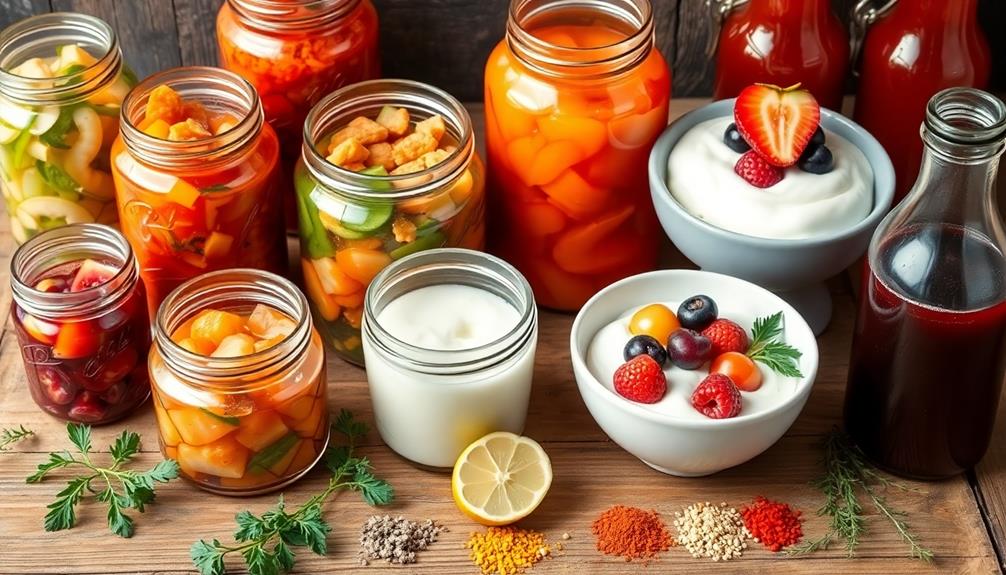
Fermented foods come in a variety of delicious forms, each offering distinct flavors and health benefits. From creamy yogurt to tangy sauerkraut, these foods are packed with probiotics that can greatly improve gut health. Here's a quick overview of some popular fermented foods you should consider incorporating into your diet:
| Type | Key Benefits | Fermentation Process |
|---|---|---|
| Yogurt | High in calcium, probiotics | Lactic acid fermentation |
| Kimchi | Rich in vitamins A, B, and C | Lactic acid fermentation |
| Sauerkraut | Packed with vitamins C and K | Lactic acid fermentation |
| Kefir | Contains diverse probiotics | Lactic acid fermentation |
| Kombucha | Antioxidants and probiotics | Alcoholic fermentation |
Including a variety of fermented foods in your daily meals can enhance digestion, boost immunity, and increase nutrient absorption. Aim for 1-3 servings a day to reap the maximum benefits. By embracing these flavorful foods, you're not just treating your taste buds; you're also taking considerable steps towards better gut health.
Kenji Morimoto's Fermentation Journey

Exploring fermented foods can spark a passion for food preservation, just like it did for Kenji Morimoto. As a fourth-generation Japanese American based in London, Kenji's journey began in childhood when he made tsukemono (Japanese pickles) for family gatherings. This early experience ignited a lifelong fascination with preserving food that only grew during the pandemic when he launched his Instagram account, @kenjcooks.
Kenji's exploration of fermentation aligns with the growing trend of cultivating ingredients like chia seeds at home, where growing chia seeds offers a sustainable way to enhance gut health through nutritious additions to fermented dishes.
Kenji's culinary path has taken him across the globe, where he's honed his skills in various settings. His diverse experience includes:
- Cooking in Poland, enhancing his culinary repertoire
- Running supper clubs to share his love for fermented foods
- Leading kimchi workshops, educating others on gut health
- Experimenting with different fermentation techniques
- Emphasizing safe fermentation practices at home
Through his content, Kenji promotes the importance of methods like dry brining lacto-fermentation. His journey exemplifies how exploring fermented foods can deepen your understanding of gut health and inspire creativity in the kitchen.
With Kenji as your guide, you can initiate your own fermentation adventure, embracing both flavor and wellness.
Dry Brining vs. Wet Brining

When deciding between dry brining and wet brining for your fermentation projects, understanding the key differences can help you achieve the best results.
Dry brining involves using salt to draw moisture from vegetables, allowing their own juices to create a brine. This method works wonders for high-water-content vegetables like cabbage, making it ideal for fermented foods. Additionally, the natural fermentation process can enhance the nutritional profile of your vegetables, potentially improving gut health, as noted in celery juice and pregnancy.
On the other hand, wet brining requires mixing salt with water to create a brine, which is better suited for lower-water-content veggies like cherry tomatoes or carrot sticks.
In dry brining, you'll start by chopping and massaging the vegetables with salt, which helps extract the brine. For wet brining, you simply submerge the vegetables in a prepared salt-water solution. The salt concentration in wet brining typically ranges from 2-5% based on the water weight, while dry brining relies heavily on the natural juices of the vegetables.
Whichever method you choose, successful fermentation depends on ensuring the vegetables remain submerged in the brine. This prevents exposure to air, which can lead to spoilage and ruin your fermented foods.
Choose wisely for the best outcome!
Making Sauerkraut at Home
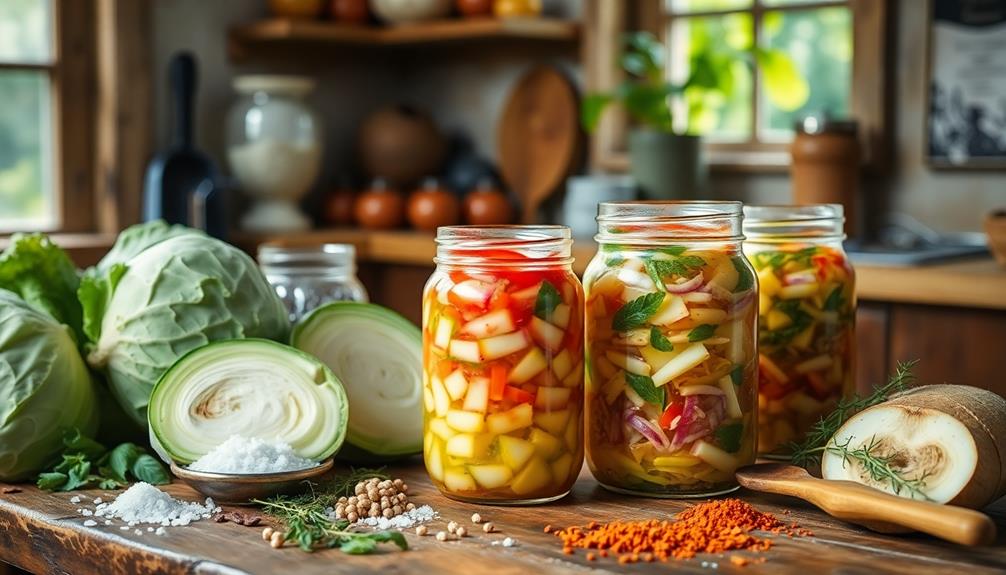
Making sauerkraut at home is a rewarding way to harness the benefits of fermentation, much like the methods of dry and wet brining discussed earlier.
This process, similar to how ancient civilizations utilized the nutritional value of chia seeds, is straightforward and allows you to create delicious fermented products that are rich in lactic acid, promoting gut health.
To start, follow these steps:
- Chop fresh cabbage and sprinkle it with salt.
- Massage the cabbage to extract its natural brine.
- Pack the salted cabbage tightly into a jar, keeping it submerged beneath the brine.
- Burp the jars periodically by opening them to release gas buildup.
- Allow the sauerkraut to ferment at room temperature for at least 2 weeks.
Adjust the fermentation time based on your taste preference; a longer duration will lead to a tangier flavor.
Once you're happy with the taste, transfer the sauerkraut to the refrigerator. This slows down fermentation, preserving its taste and texture.
Incorporating Fermented Foods Into Diet
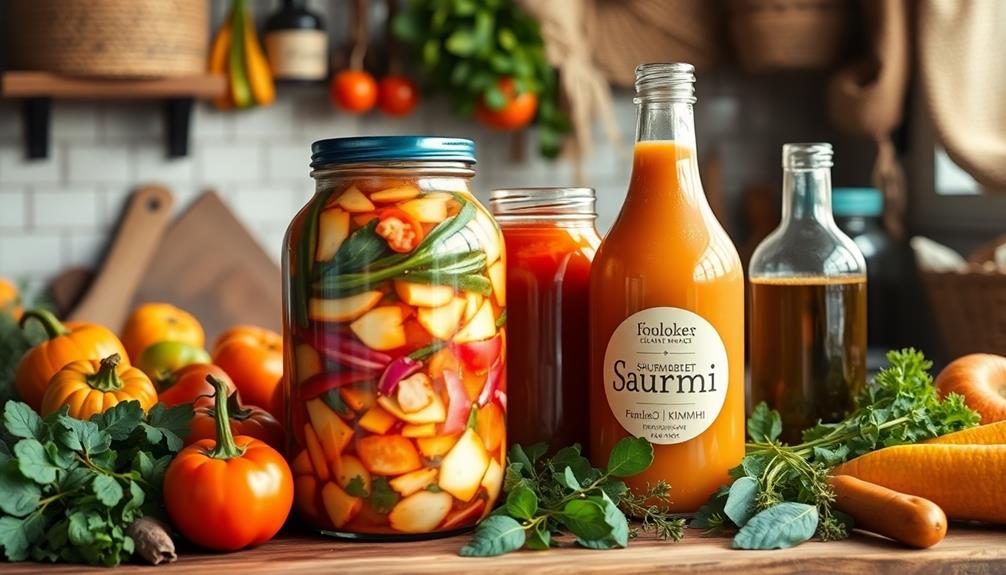
Incorporating fermented foods into your diet is easier than you think, and it can greatly boost your gut health.
Start with simple recipes, like yogurt or kimchi, aiming for 1-3 servings daily to maximize benefits.
As you experiment with these foods, you'll find what works best for your taste and digestive system.
Easy Fermented Food Recipes
Adding fermented foods to your diet can be a delicious and simple way to boost your gut health. These foods help enhance your microbiome due to their rich probiotic content. Start with 1-3 servings daily and gradually increase your intake. This way, you can monitor your body's response and avoid any digestive discomfort.
Here are some easy fermented food recipes to get you started:
- Lacto-Fermented Vegetables: Chop your favorite veggies, mix them with salt, and let them ferment in a jar for a few days.
- Homemade Yogurt: Use milk and a starter culture to create creamy yogurt packed with probiotics.
- Kimchi: Combine napa cabbage, radish, garlic, and spices, then let it ferment for a spicy, tangy treat.
- Kombucha: Brew black or green tea with sugar and a SCOBY for a revitalizing drink.
- Sauerkraut: Shred cabbage, mix with salt, and ferment to enjoy this classic dish.
When shopping, look for products labeled with "live cultures" to maximize the health benefits of these fermented foods.
Enjoy experimenting with flavors while supporting your gut health!
Daily Fermented Food Intake
Fermented foods can easily fit into your daily meals, enriching your diet with probiotics that support gut health. Aim to incorporate 1-3 servings a day to introduce beneficial bacteria into your system, greatly enhancing your overall health.
Popular options like yogurt, kefir, sauerkraut, and kimchi not only add diverse flavors but also boost digestion and nutrient absorption.
Start by gradually adding these foods to your meals. This way, you can monitor how your body reacts and avoid any digestive discomfort.
Look for products labeled with "live cultures" to verify you're getting the most probiotic benefits from store-bought options.
If you're feeling adventurous, consider DIY fermentation. This method allows you to customize flavors and ingredients, making it an economical way to enjoy the health benefits of fermented foods at home.
Plus, you'll have full control over what goes into your food.
Frequently Asked Questions
Do Fermented Foods Actually Help Gut Health?
Yes, fermented foods can boost your gut health. They're rich in probiotics, which enhance gut microbiome diversity, improve nutrient absorption, and may alleviate digestive issues like bloating, leading to better overall well-being and mood.
What Is the Best Fermented Food for Gut Health?
Think of your gut as a garden; the best fermented food for it is yogurt, packed with live cultures. It nurtures your digestive flora, helping you thrive and feel your best every day. Enjoy its creamy goodness!
How Long Does It Take to Heal Your Gut With Fermented Foods?
It can take you anywhere from a few weeks to several months to heal your gut with fermented foods. Consistent consumption of these foods can lead to noticeable improvements in your digestive health within 4 to 12 weeks.
What Does Fermentation Do for Your Gut?
Fermentation boosts beneficial probiotics, enhances nutrient absorption, reduces gut inflammation, and supports your gut-brain connection. It helps you digest better, feel lighter, and even lifts your mood through natural neurotransmitter production.
Conclusion
As you commence on your own fermentation journey, imagine your gut as a vibrant garden, flourishing with life. By incorporating fermented foods, you're not just feeding your body; you're nurturing a diverse ecosystem. Just like a skilled gardener, you'll cultivate balance and health, allowing your inner landscape to thrive. So, grab your jars and embrace the alchemy of fermentation—each bite is a step towards a healthier, happier you. Let your culinary adventure begin!

